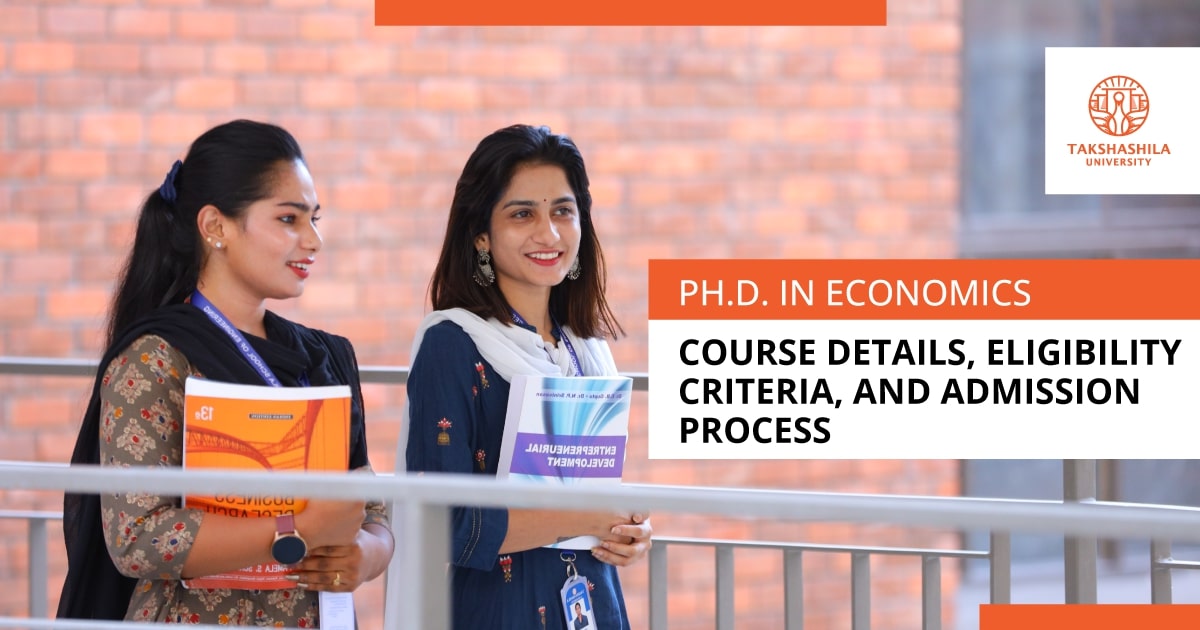A PhD in Economics is the highest qualification that develops students with advanced research skills and a deep core concepts understanding of economic theories and scenarios. Every PhD course has its weightage topics and importance. However, economics mainly deals with national GDP growth. Through this degree, people will learn more about fundamental national scheme generators and global economic status. To improve the life standard of needy people.
The field of Economics has a proven impact on policy-making, business strategies, and societal welfare. In the era of globalisation and fast technological advancement, the need for skilled economists to analyse complex economic issues and offer helpful solutions has never been greater.
In this blog, we will discuss the Course Details, Eligibility Criteria, Admission Process, the importance of economics in national growth development, GDP, and the Future scope of this domain.
Course Details
Programme Overview
The Ph.D. in Economics at Takshashila University is structured to offer an in-depth Importance of learning economics and ethics to follow this segment in GDP
Here’s what students can expect from the course:
- Duration: The Ph.D. programme typically spans 3 to 5 years, depending on the candidate’s research speed and project requirements completion.
- Curriculum Design: The curriculum includes foundational courses in microeconomic and macroeconomic theory, quantitative methods, econometrics, GDP, globalisation, national income and research methodology. PhD scholars are encouraged to engage in seminars and workshops to enhance their research on national growth factors’ capabilities.
Core Subjects
- Microeconomic Theory: This course covers the behaviour of individuals and firms in making decisions regarding the allocation of resources like raw materials, manpower, etc
- Macroeconomic Theory: focuses on the economy as a whole, analysing aggregate indicators like GDP, import and export terms, trade values, asset tax, unemployment rates, and inflation.
- Econometrics: A crucial subject that introduces quantitative econometric analysis methods, helping students econometric analysis methods, helping students conduct practical research.
- Research Methodology: This course provides students with the necessary tools to conduct strict and relevant economic research.
- Specialisation Electives: Various elective courses, such as Development Economics, Financial Economics, and Policy Economics, allow students to tailor their studies to their interests.
Research Component
Completing original research is central to the PhD experience. Scholars are required to submit a dissertation that contributes new knowledge to the field of economics. Students will have access to mentorship from experienced faculty members and opportunities to collaborate on projects during their research.
Eligibility Criteria
To ensure a high standard of academic excellence, Takshashila University has established specific eligibility criteria for candidates interested in pursuing a Ph.D. in Economics:
- Educational Qualification: Candidates must hold a Master’s degree in Economics or a closely related field from an acknowledged institution.
- Minimum Academic Score: A minimum aggregate score of 55% (or equivalent) in the Master’s degree is generally required.
- Entrance Examination: Candidates may need to pass an entrance examination conducted by the university or eligible national-level examinations like GRE or UGC-NET.
- Research Proposal: Applicants should submit a well thought out research proposal detailing their intended area of research and objectives. This proposal is a vital component of the application process as it evaluates the applicant’s skills for doctoral study.
- Interviews: Shortlisted candidates may be called for an interview to assess their research aptitude and fit for the programme.
Admission Process
The admission process for the Ph.D. in Economics at Takshashila University is structure to be straightforward and supportive for prospective students:
- Application Submission: Candidates should begin by completing the online application form on the university’s website. Proper documentation must be attached, including academic transcripts, entrance exam scores, and the research proposal.
- Entrance Exam and Interview: Candidates will have to appear for the entrance exam as per the university’s guidelines. Shortlisted candidates will be called for interviews, which form the basis for final admission decisions.
- Final Selection Following the interview, the admissions committee will review candidates based on their academic background, research proposal, and interview performance.
- Enrolment Procedure: Selected candidates will receive an offer of admission and must complete the necessary enrolment formalities, including payment of fees and submission of required documents.
- Orientation Programme: Upon enrolling, new students will generally participate in an orientation programme designed to introduce them to the university’s resources, faculty, and research facilities.
How Ph.D. Improves Economic Standards
Earning a Ph.D. in Economics enhances an individual’s capability to understand and impact various economic frameworks. Here are several ways through which obtaining a PhD contributes to improving economic standards:
- High-Level Research: PhD candidates undertake detailed research that often results in new ideas for economic models and theories, which can be used to control economic actions and policies.
- Policy Formulation: Economists with a Ph.D. frequently advise governments and institutions on economic policies, assuring that such policies are dropped in strict practical research.
- Educational Contributions: Ph.D. holders often enter into teaching the next generation of economists, bringing high-level concepts and research findings into the classroom, thus improving the overall quality of education in economics.
- Community Development: By researching and addressing economic issues at the micro-level, PhD scholars contribute to developing sustainable economic practices that uplift communities and improve lifestyle standards.
- International Collaboration: PhD graduates mostly collaborate and engage in global economic discussions that can lead to implementing best practices from various countries, improving the economic framework in their home country.
How Economists Improve GDP
The Gross Domestic Product (GDP) is a crucial indicator of a country’s economic health, reflecting the total value of goods and services produced within it. Economists play a crucial role in improving GDP through:
- Identifying Growth Drivers: Economists analyse different sectors of the economy to identify underperforming areas and propose methodologies to enhance productivity and growth.
- Policy Recommendations: Economists use their research to advocate for policies that stimulate economic activity, such as tax incentives, subsidies, or infrastructure development.
- Investment Strategies: By providing insights into economic trends and forecasts, economists help businesses and governments make informed investment decisions that can drive growth.
How Ph.D. Scholars in Economics Help to Build a Nation
Ph.D. scholars in Economics are vital to national development. Their contributions extend beyond academic research and teaching to include:
- Advising Policymakers: Ph.D. graduates often work closely with government officials, providing the necessary data and analysis to make informed decisions affecting economic stability and growth.
- Research and Development: By investigating local and global economic issues, PhD scholars provide essential research that underpins national strategies for economic growth.
- Global Competitiveness: They engage in international dialogues, sharing insights that not only help their own country but also position it competitively within the global economy.
Future of Economics
The future of economics is promising, shaped by emerging trends and evolving global contexts. Here are several factors that will influence the future trajectory of the field:
Globalisation and Trade: As economies become increasingly interconnected, understanding global economic dynamics will be crucial for policymakers and businesses.
Health Economics: The recent global health crises have highlighted the importance of health economics, making expertise in this area vital for future economic stability and recovery.
Job Roles for Ph.D. Graduates in Economics
Ph.D. graduates in Economics can work in various career paths with advanced roles that require high-level analytical and research skills. Some common job roles include:
| Job Title | Responsibilities |
| University Professor | Teaching economics, conducting research, and mentoring students. |
| Economic Consultant | Advising organisations on economic strategy and policy development. |
| Research Analyst | Conducting detailed economic research for government or private sectors. |
| Policy Advisor | Providing data-driven policy recommendations to government bodies. |
| Data Scientist | Analyzing economic data to support strategic decision-making. |
| Market Research Analyst | Evaluating market trends and providing insights to businesses. |
| Financial Analyst | Conducting financial forecasting and investment analysis. |
| Development Economist | Working within international organisations to promote economic development. |
Salary Range for Ph.D. Graduates in Economics
The salary range for Ph.D. graduates in Economics can vary significantly based on factors such as job title, location, and industry. Here’s a general overview of typical salary ranges:
| Job Title | Average Salary Range (INR) | Average Salary Range (USD) |
| University Professor | 8,00,000 – 20,00,000 | $100,000 – $150,000 |
| Economic Consultant | 6,00,000 – 15,00,000 | $75,000 – $130,000 |
| Research Analyst | 5,00,000 – 12,00,000 | $70,000 – $110,000 |
| Policy Advisor | 7,00,000 – 18,00,000 | $85,000 – $140,000 |
| Data Scientist | 6,00,000 – 15,00,000 | $80,000 – $120,000 |
| Development Economist | 7,00,000 – 20,00,000 | $90,000 – $150,000 |
Takshashila: The Gateway to Transformative Economic Leadership
At Takshashila University, Future economists are strong enough to build a strong nation. To achieve this standard in an economics PhD, you must master many skills, such as research, GDP, firm handling, trades, asset investments, and more. Join our PhD in Economics program and take the first step towards becoming a thought leader in global economics.
Wide range of approaches: Encourages integrating economics with technology, environment, and public health for innovative research.
Strong Alumni Network: Graduates are placed in the best roles in education, government, and corporate sectors worldwide.
Impactful Research: Scholars contribute to policy recommendations and economic frameworks at national and international levels.
Global Perspective and Networking
The university’s collaborations with international universities create opportunities for exchange programs and joint research projects. This exposure allows scholars to build a global network and gain insights into international economic trends and policies.
With Takshashila, your journey isn’t just about a degree. It’s about transforming the world of economics and making a significant impact.
Conclusion
From the above section, you have some information about doing a PhD in economics. Based on this clarity, you can choose your college, criteria, and fee details in one platform. Economics plays a huge part in developing nations; taking it as a career creates ample benefits. Remember world demands on economic variations, the contributions of Ph.D. graduates are vital for economic growth, policy development, and the enhancement of living standards. Whether aiming for careers in academia, consultancy, or public policy, the demand for skilled economists continues to grow, making it a bright time for the future.
FAQ – Ph.D. in Economics
1.What is the duration of a Ph.D. in Economics?
The typical duration is 3-5 years, depending on the research topic and the individual’s speed of study.
2.What are the eligibility criteria for admission?
Applicants generally need a master’s degree in Economics or a related field, with a minimum aggregate score set by the institution.
3.Is there an entrance exam for admission?
Many universities require candidates to take an entrance exam or present valid GRE/GMAT scores.
4.What research areas can I pursue in a Ph.D. programme?
For example developmental economics, international trade, financial economics, national GDP and monetary policy.
5.What career options are available after earning a Ph.D. in Economics?
Graduates can work in teaching, government, non-profits, or the private sector in various roles such as economists, data analysts, head of accounting, asset checker, investment experts or policy advisors.






